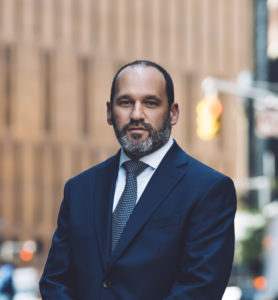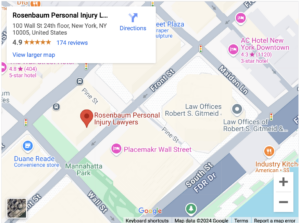New York Anesthesia Injuries Lawyer

Have you been injured due to an anesthesia error in New York, NY? Anesthesia malpractice can lead to serious and life-changing injuries. You may be entitled to compensation for your lost earnings, pain and suffering, and medical bills.
For over 40 years, Rosenbaum Personal Injury Lawyers has represented patients in New York City who have been injured in medical malpractice. Contact our law firm to schedule a free consultation with a New York anesthesia injuries lawyer to discuss your case.
Table of Contents
How Rosenbaum Personal Injury Lawyers Can Help After You Suffer Anesthesia Injuries in New York

When you are left injured after surgery, you may feel overwhelmed, frightened, and unsure where to turn.
How do you investigate your accident to find out if your suspicions about malpractice are true? How do you prove a case to recover the money you need? A New York personal injury lawyer can be invaluable in helping you navigate the legal system and fight for the compensation you deserve.
Rosenbaum Personal Injury Lawyers has represented clients in New York, New York, for more than four decades. Our attorneys have a 10.0 Superb AVVO rating and have been named among America’s Top 100 Attorneys. Our personal injury lawyers will fight the insurance company and hospital on your behalf for fair compensation.
Trust Rosenbaum Personal Injury Lawyers to:
- Offer the insightful legal advice you need
- Investigate the circumstances of your procedure
- Gather and interpret evidence to build the strongest possible case of negligence
- Work with financial and medical experts to prove causation and the value of your damages
- Negotiate on your behalf with the insurance companies
- Present a compelling case to the jury to seek maximum damages if the insurance company won’t offer a fair settlement
You do not deserve financial uncertainty on top of the physical and psychological harm you have already suffered. Call our law office today for a free case review with a compassionate New York anesthesia injuries lawyer who can help.
How Common Are Anesthesia Injuries?

As recently as the 1970s, anesthesia-related deaths were as high as 1 in every 10,000 to 20,000 patients.
Advances in medicine and technology have made anesthesia safer than ever, reducing the anesthesia fatality rate to about 1 in every 200,000.
There were 2,211 anesthesia-related deaths in America within a recent seven-year period. A study conducted by Columbia University on these fatalities found that complications from anesthesia were the underlying cause in almost 11% of deaths.
Of these, nearly 80% were due to adverse effects during therapeutic use, 19% occurred during pregnancy or labor, and 1% were caused by incorrectly placed endotracheal tubes. In the remaining percentage of deaths, anesthesia complications were a contributing factor.
While you can take steps to protect yourself from medical mistakes, it can be difficult to protect yourself from anesthesia errors.
Overview of Anesthesia Injuries
Every surgery comes with risk. One of the biggest risks of surgery is anesthesia. Even outside of malpractice or medical error, anesthesia poses some risk.
Certain health conditions can increase the risk of anesthesia and lead to an injury. Conditions like obstructive sleep apnea, lung issues, heart disease, and diabetes can increase side effects. Some people are allergic to anesthesia or have an adverse reaction.
General anesthesia, the type of anesthesia that causes unconsciousness for surgery, comes with the most risk of injury and adverse reaction.
Types of Anesthesia Injuries
While uncommon, anesthesia injuries still occur. The Journal of Healthcare Risk Management published a study on anesthesia injuries based on malpractice claims. The most common types of anesthesia-related injuries included:
- Dental damage (20.8% of claims)
- Death (18.3%)
- Nerve damage (13.5%)
- Organ damage (12.7%)
- Cardiopulmonary arrest (10.7%)
Other common injuries caused by anesthesia malpractice include brain damage, coma, trachea damage, asphyxia, stroke, and spinal cord injuries.
Tooth damage was the most common and least serious type of anesthesia-related injury. Obesity was the most common contributing factor leading to an anesthesia malpractice claim.
What Are the Signs and Symptoms of Anesthesia Injuries?
Anesthesia itself causes a range of common side effects. It also comes with some common but minor risks.
Postoperative nausea and vomiting (PONV) affects up to 30% of people after surgery and is most common during the first 24 hours. An additional 25% of people experience PONV after they are discharged. Sore throat and shivering or chills are also common.
However, some patients experience injury from anesthesia that goes beyond temporary, minor side effects.
Some patients experience neurologic complications or brain damage from anesthesia. Postoperative delirium or cognitive dysfunction may cause long-term learning and memory issues in some patients. Administering too much anesthesia increases the risk of postoperative delirium.
Signs of postoperative delirium include:
- Trouble focusing
- Agitation or aggression
- Hallucinations
- Slurred speech
- Fatigue
- Rapid changes in mood
Anesthesia errors may also cause stroke, seizures, heart attack, organ damage, and nerve damage. The signs and symptoms will depend on the type of injury sustained.
What Are the Long-Term Consequences of Anesthesia Injuries?
Postoperative delirium from anesthesia is a side effect that can happen regardless of whether there was medical malpractice. This fairly common consequence, most common in older patients, usually lasts for hours or days, but it may cause long-term learning and memory issues. Anesthesia has also been linked to other long-term but subtle cognitive issues as well.
A more serious anesthesia injury can have a more lasting and serious impact. An anesthesia-related stroke, for example, may cause anything from cognitive impairment and changes in thinking, emotion, and personality to physical impairment or paralysis.
Nerve damage from a stroke is sometimes permanent and may lead to chronic pain, numbness, and impaired function.
What Causes Anesthesia Injuries?
Anesthesia injuries may be the result of an adverse reaction to anesthesia. For example, malignant hyperthermia is a serious and potentially life-threatening adverse reaction that some people inherit.
Certain health conditions can increase the risk of anesthesia complications, such as:
- Heart disease or high blood pressure
- Diabetes
- Seizures
- Obstructive sleep apnea
- Smoking
- Obesity
- Lung conditions
While some anesthesia risks are outside anyone’s control, medical negligence can also cause anesthesia injuries. Anesthesia errors are one type of surgical error, a form of medical malpractice.
Part of an anesthesiologist’s duty to a patient is to assess their medical history and medications to determine their risk and mitigate this as much as possible. They also have a duty to administer the proper dosage, intubate the patient correctly, administer oxygen, and monitor the patient.
Anesthesia errors may cause injury, including:
- Administering anesthesia to a patient with known allergies
- Failing to administer oxygen
- Failing to properly monitor the patient’s vital signs
- Improper anesthesia dosage
- Improper intubation
- Poor communication among members of the surgical team
- Failing to properly warn a patient of instructions
- Sedation prolonged to a dangerous degree
- Delayed delivery of anesthesia
- Failing to plan for, recognize, and treat anesthesia complications
Anesthesia is generally considered safe for most healthy patients. However, when an anesthesiologist or other medical provider makes a mistake or is careless, a patient under anesthesia may be at risk of serious complications.
What Is My Anesthesia Injury Case Worth?
Medical malpractice cases are complex and may have a significant value for serious and life-long injuries.
However, the value of your case will depend on many factors such as:
- The type of malpractice that led to your anesthesia injury
- The amount of insurance coverage and whether the hospital can be held liable
- The type and severity of your injuries
- Whether you are impaired or face lifelong medical needs
- How your life has been affected by your injuries
There is no limit to the economic and non-economic damages you can recover in a medical malpractice lawsuit in New York. By comparison, most states cap non-economic damages on malpractice claims.
What Compensation Can I Recover for My Anesthesia Injury in New York, New York?

Anesthesia injury claims may be filed against any medical professionals whose negligence contributed to your injury. This typically includes anesthesiologists, hospitals, and clinics. Shockingly, research has found that hospitals benefit financially from surgical errors despite malpractice claims.
A medical malpractice claim can allow you to recover compensation for:
- Lost wages and lost earning capacity. This may involve calculating your lost earnings in the future if you were impaired or disabled.
- Medical expenses. This includes current treatment you have received for your injuries as well as future medical bills. Catastrophic and serious injury may require a lifetime of medical treatment.
- Pain and suffering
- Mental anguish
- Emotional distress
At Rosenbaum Personal Injury Lawyers, we will work with economic and medical experts to calculate the full value of your damages and fight for full compensation.
How Long Do I Have to File a Medical Malpractice Lawsuit in New York City?
Under New York law, you have 2.5 years from the date of the injury to file a medical malpractice claim. If your case is not filed by the deadline, you are barred from seeking financial compensation. However, New York allows for some exceptions to this statute of limitations.
The discovery rule allows you to file a claim outside this deadline based on when your injury was known or should reasonably have been known. This rule can be applied in two scenarios.
In the case of foreign objects left in the body, you can pursue a claim when you discover the foreign object. However, you must then bring your claim within one year of the discovery.
This rule was expanded under Lavern’s Law for cases involving failure to diagnose cancer. After discovering a failure to provide proper treatment or misdiagnosis involving cancer, you have 2.5 years to file a claim. Your claim must still be filed within 7 years after the negligence.
Note that claims against New York state and municipal hospitals and facilities are subject to a shorter statute of limitations. You must notify the state government of your injury within 90 days and file a malpractice lawsuit within 15 months.
Contact Our NYC Medical Malpractice Law Firm for a Free Consultation
Medical malpractice claims involving anesthesia can be complex and require an involved investigation. At Rosenbaum Personal Injury Lawyers, we bring more than 40 years of legal experience to your case for the representation you deserve. Contact our law office to schedule a free consultation with a New York anesthesia injuries lawyer. We work on a contingency fee basis to help you with your anesthesia malpractice case.



